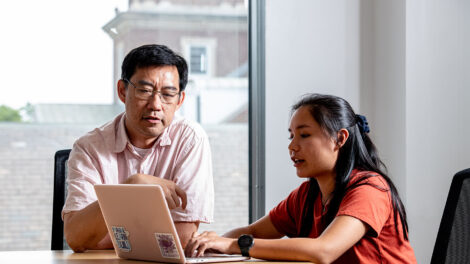Hands-On Research

Lafayette's EXCEL Scholar Program
Lafayette's EXCEL Scholars program allows students to work closely and collaboratively with faculty on significant research projects that hone critical-thinking and communication skills
Through his research, Jacob Potter '23 hopes to understand what makes a society open, civil, and accepting
Each summer, Lafayette College students have the opportunity to participate in academically meaningful experiences outside the classroom. Students selected as EXCEL Scholars engage in collaborative research projects with Lafayette faculty, enhancing their academic skills as well as developing other skills that will be useful in post-graduate education and careers. This summer, we are highlighting several scholars who are working on hands-on, collaborative research projects with faculty and other students.

Jacob Potter ’23 is assisting with research on gender equality policies in Hungary, Poland, and Russia
“My research is primarily focused on how gender equality policies—such as addressing gender violence, creating and maintaining gender studies programs in public universities, legalizing same-sex marriage, upholding reproductive and sexual rights, and supporting antidiscrimination policies—are undermined or dismantled by anti-feminist, or ‘anti-gender,’ politicians, political parties, and social organizations in Hungary, Poland, and Russia. The goal of the research is to better understand what makes a society open, civil, and accepting, and what hateful or discriminatory discourses disrupt that.”
“Whether a democracy succeeds or fails isn’t by chance, but instead depends on whether elections are free and fair, whether there are genuine safeguards against corruption, and how independent the media is, among many other factors. In a sense, I’m doing this project to understand how democracy can be protected: One of these ‘many other factors’ that can spell democratic success or failure is whether gender equality policies are upheld and how strong they are. I find this research important because, although it seems like debates on gender have only recently entered the U.S. culture wars context, these debates have raged in post-communist Europe for over a decade—and there’s a lot to be learned from how different social, political, and economic interests in Polish and Hungarian society have responded. I find researching the topic of gender equality policies and how they can be undermined by ‘anti-gender’ actors interesting because it is, to me, such a unique way to evaluate the health of a democracy. Without the opportunity to be an EXCEL Scholar, I would’ve never been able to engage with what I have found to be a fascinating perspective.”
“In my sophomore year, in spring 2021, I took Prof. Fabian’s Politics of Post-Communism: Russia, East-Central Europe, and Central Asia course. For my final project in that course, I wrote a paper comparing and evaluating the independence of Hungary and Poland’s judiciaries. In other words, how independent the courts are from the executive branches in those countries. At first, engaging with this topic proved to be a challenge: Here were two countries I knew very little about, with their own rich and unique histories, and with government structures that don’t quite resemble ours here in the U.S., but don’t quite resemble each other’s either. Prof. Fabian’s support allowed me to respect the intricacies of my research question, without being too reductive. Evaluating whether a country has judicial independence is, of course, different from evaluating how strong a country’s gender equality policies are, but they’re both ultimately ingredients in the ‘democratic soup.’
“Although my partnership with Prof. Fabian began under virtual circumstances, it has become exactly the close, productive, and inspiring faculty-student relationship you’d hope to discover when coming to a small liberal arts college. Since that course, Prof. Fabian has become my faculty adviser, my honors thesis adviser, and, of course, my EXCEL adviser. I’ve learned by working with Prof. Fabian that ‘diving deep’ doesn’t—and shouldn’t—mean staying at the bottom of the proverbial swimming pool. Instead, hard work and ‘diving deep,’ especially when you’re trying to engage with dense, theoretical texts, often means opening your eyes for just a few seconds under the water and then swimming back to the surface to catch your breath. Doing this—even if it takes a few hundred times—and giving yourself time to breathe, I’ve learned from Prof. Fabian, is better than the alternative.”
“Although it isn’t available to readers just yet, an essay that I’ve been helping Prof. Fabian work on since February recently passed a final round of peer review, and is set for publication. I’m also in the midst of helping Prof. Fabian organize a collection of essays to be published on ‘anti-gender’ policies in the post-communist region, with a focus on how Russia’s invasion of Ukraine complicates this question.
“I hope these projects help readers better understand anti-feminist, or ‘anti-gender,’ politicians and social organizations in Hungary, Poland, and Russia, how these actors damage a democracy’s health, and why having strong gender equality policies leads to a strong democracy.”
“Although I won’t continue researching ‘anti-gender’ policies, my time as an EXCEL Scholar has made me even more interested in Hungary and Poland’s democratic backsliding and what possible interventions might exist to address these developments. It is this theme that my honors thesis in government and law will be focused on.”
“After I graduate from Lafayette, I intend to pursue a J.D. My experience as an EXCEL Scholar will absolutely serve me in the future. Beyond just the immediate relevance of some of the content I’ve enjoyed engaging with while working as an EXCEL Scholar (such as what rule of law has to do with democratization and how it’s maintained, or how a country’s constitution being worded in a particular way can undermine laws that aim to promote gender equality policies), I’ve put in many hours under Prof. Fabian’s guidance to strengthen essential researching, editing, and writing skills.”

Lafayette's EXCEL Scholars program allows students to work closely and collaboratively with faculty on significant research projects that hone critical-thinking and communication skills